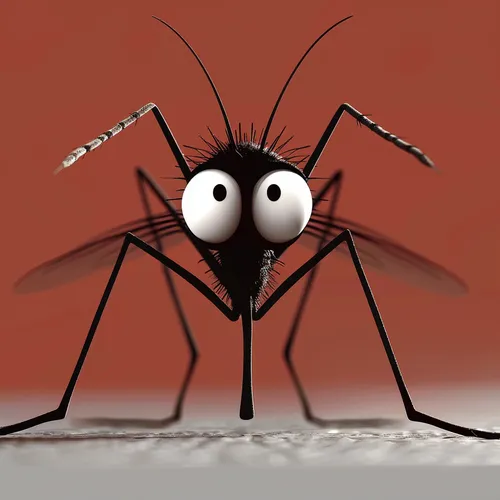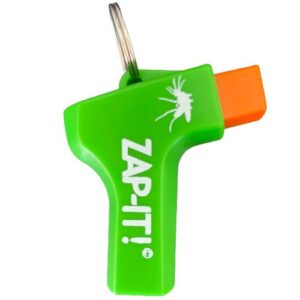When the ice and snow have thawed and the sun makes its long-awaited reappearance, it’s time to pull out the shorts and tank tops and get ready for the first barbecue or picnic of the season. But your anticipation soon turns to dread as you remember what last year’s barbecue season was like: constantly battling the war against mosquitoes. Will this year be the same?
A lucky proportion of the population – around 15% – are naturally immune to mosquito bites. But for the rest of us, mosquitoes and the high likelihood of suffering multiple mosquito bites at an outdoor event can be enough to ruin the thought of the upcoming barbecue and picnic season.
This begs the question: why is it that some people are more likely to be bitten by mosquitoes than others? Luckily, we no longer need to wonder. Dr Jonathan Day from the University of Florida is a renowned entomologist and has been asking the same questions. As it turns out, a person’s likelihood of featuring heavily on a mosquito’s summer menu comes down to a unique combination of skin chemicals, body temperature, and natural body odours.
1. Natural Mosquito Repellents
By looking at the lucky 15% of people who seem to be naturally immune to mosquitoes and other biting insects, scientists have been hard at work trying to develop a mosquito repellent that actually works. Researchers at Rothamsted Research Lab in the UK have used chromatography to identify the chemicals produced by these naturally mosquito-repellent people to work out why mosquitoes steer clear. With this information, these researchers have been able to identify natural repellents that excrete just the right mixture of substances that mosquitoes can’t stand.
2. Genetics
As it turns out, resistance to mosquitoes is highly hereditary. Many of the factors that determine how attractive a person is to mosquitoes are ones that are inherited from our ancestors, including blood type and metabolic rate. Since science has not progressed to the point of allowing people to modify their DNA, the genetic relationship between a person and the local mosquito population unfortunately cannot be changed.
3. Pregnancy
Is it really true that pregnant women are more likely to be bitten by mosquitoes? As it turns out, this is more than an urban legend. Pregnancy causes a woman’s body temperature to increase by around 1.26 degrees Fahrenheit and to omit around 21% more CO2 than a woman who is not pregnant, making them around twice as likely to be bitten by mosquitoes. Luckily, this strange effect returns to normal following the end of the pregnancy.
4. Skin Bacteria
As strange as it is to think that we have various bacteria constantly living on our skin, it’s even stranger to realise that the types and levels of bacteria can change how attractive a person is to mosquitoes and other insects.
As it turns out, the fewer different species of bacteria on your skin, the more attractive you will be to mosquitoes. On the other hand, if you have a wide variety of different types of bacteria on your skin, mosquitoes are more likely to steer clear. This phenomenon explains why mosquitoes often target a person’s ankles and feet, as these areas of the body are more likely to host strong levels of only a few types of bacteria.
5. The Battle of the Sexes
It is a widely held belief that women are more likely to be bitten by mosquitoes because of their higher levels of oestrogen. However, this is largely untrue. In fact, the opposite holds to be true. Men are more likely to be attacked by mosquitoes simply because men, in general, are larger than women. The larger the person, the greater the levels of CO2 emitted, the greater the body temperature, and the greater the amount of lactic acid produced.
6. Alcohol
As much as you might enjoy a relaxing alcoholic drink on a balmy summer day, so too do mosquitoes enjoy the taste of alcohol. In fact, consuming three bottles of beer can line you up for around 30% more mosquito bites than if you hadn’t had anything to drink.
Mosquitoes’ preference for alcohol has little to do with the taste or feel of the drink, but everything to do with the way a person’s body temperature increases after they’ve consumed alcohol.
In fact, mosquitoes have been documented to eat fermented fruit, which is yet another indicator that there is something about alcohol that pleases them. To further complicate matters, mosquitoes are lucky enough – unlike humans – to have a naturally occurring enzyme to break down alcohol before it reaches their nervous system. This means that mosquitoes can happily consume alcohol, either through fermented fruit or through the blood of a human that has been drinking, without it having any typical alcohol-related effects on them.
7. Blood Type
Did you know that it’s actually only female mosquitoes that bite humans? Male mosquitoes are more interested in the nectar from plants and flowers, while females bite humans to access the protein in human blood, which they use to produce their eggs.
While scientists haven’t figured out exactly why, they do know that people with the O blood type are around twice as likely to be bitten by a mosquito than people with the A blood type, with B blood types coming somewhere in-between. As it turns out, the 15% of the population who are generally ignored by mosquitoes are people who – for reasons unknown – do not broadcast their blood type to the insect world. For this reason, mosquitoes don’t consider them to be a good source of blood and will leave them alone.
8. Colour
Mosquitoes are sensitive to colour, which is good news to humans as we can use this information to our advantage. It might sound counterintuitive, but wearing clothes in black and other dark shades can make you stand out more to mosquitoes than if you were wearing white or other light colours.
The reason comes down to a mosquito’s inability to fly in even a light breeze. To protect themselves from strong winds, mosquitoes have learned to compare the silhouettes of their prey against the horizon, enabling them to stay closer to the floor. Since the horizon is typically a light, bright colour, darker colours are more easily detected by a mosquito than light colours, which can blend in with the surroundings.
Similarly, a lot of movement can make it easier for mosquitoes to spot you as prey. The more you move around, the more likely it is that mosquitoes will recognise that you are easy prey and launch their attack.
9. Carbon Dioxide (CO2)
Think back to high school biology and you’ll remember that humans, as living vertebrates, are able to process oxygen and convert it into carbon dioxide. Mosquitoes have evolved to recognise carbon dioxide emissions as a way of distinguishing potential prey from other objects.
Of course, there is no way of completely eliminating carbon dioxide emissions, short of holding your breath indefinitely; however, there are ways of reducing the amount of CO2 you emit. People engaged in high levels of activity naturally emit greater levels of carbon dioxide due to their increased rate of breath. While this is something that you can control, your metabolic rate – the amount of energy your body uses in a set amount of time – is slightly harder to change. People with a higher metabolic rate emit greater levels of carbon dioxide than those with a relatively lower metabolic rate.
While your metabolism is largely part of who you are, it can vary somewhat due to your current circumstances. For example, exercising, consuming alcohol, or being pregnant or overweight can all have a negative effect on your metabolism and make you more attractive to mosquitoes and other biting insects.
10. Sweat
When we sweat, we produce a mix of chemicals from our skin. Unfortunately, some of these chemicals – lactic acid in particular – are highly attractive to mosquitoes. While it is not possible to completely prevent your body from producing lactic acid, it is possible to minimise its production. Lactic acid is a type of metabolic waste produced as a result of the body’s ability to convert sugar into fuel.
Rather than inhibiting the production of lactic acid to ward off mosquitoes, it is more helpful to consider ways of reducing the amount of sweat your body produces. The easiest way to do this, of course, is to keep your body temperature at a reasonable level. Similarly, avoiding exercise while there are mosquitoes around will stabilise your body temperature and your body’s production of lactic acid, making you less likely to be bitten by mosquitoes and other biting insects.
The Bite Blitzer: My Experience with Zap-It!
As someone who seems to attract mosquitoes like a moth to a flame, I was thrilled to test out the Zap-It! bite relief device. This pocket-sized gadget promises to zap away the itch, soothe inflammation, and reduce swelling from mosquito bites. What better way to put it to the test than by taking it along on a trip?
The Science Behind the Zap
But how does this little device actually work its magic? The Zap-It! uses mild electrical impulses (the “zaps”) to trick your body’s nerves into stopping the itch signal. It’s kind of like overriding your body’s pain signals by causing a tiny distraction.
The same basic principle is used in acupuncture and other nerve stimulation therapies. A small electrical current zaps the nerves responsible for that maddening itch, preventing them from sending their itch signal to the brain. Pretty clever!
In addition to stopping the itch, the gentle zaps also reduce inflammation and swelling around the bite by increasing blood flow. More blood means more of the good healing stuff gets delivered right to the bite to calm everything down.
So in a nutshell – zap stops the itch signal, while also reducing swelling and redness. Two for the price of one!
The First Line of Defence
It didn’t take long for the bloodsuckers to find me. Less than 24 hours after arriving on holiday, that telltale itch signalled my first bite. Instead of scratching away, I whipped out my Zap-It! and placed the flat end directly on the affected area before pressing the clicker five times, as recommended.
The sensation was strange—like a tiny pinch—but not painful. And you know what? The anticipated worsening of the itch never materialized. Even better, that angry red lump mosquito bites often leave behind was nowhere to be found.
Timing Is Everything
As the bites continued throughout my stay, I realized Zap-It! works best when you use it immediately after getting bitten. For someone as apparently delicious to mosquitoes as myself, it was tough to catch every bite right away. If I waited too long, the device wasn’t as effective in relieving those already inflamed, itchy welts.
So while Zap-It! can’t undo the misery of bites you’ve already scratched raw, it’s an excellent preventative measure when you catch them early. Zap those suckers at the first sting, and you’ll be itch-free!
The Verdict? Zap Away!
Zap-It! is easy to use and perfectly portable for travel. At just £5.95, it’s an affordable investment that should last even the most bite-prone travelers for years (it’s rated for up to 1,000 zaps!). My only word of advice? Be vigilant and zap those bites ASAP for maximum relief.
If you’re tired of scratching away while mosquitoes laugh at your misery, add this little zapper to your travel kit. A few tiny pinches from Zap-It! are well worth avoiding the insanity of endless itching and gnarly swelling. Zap bites, not annoyance!
The best part? Zap-It! is safe for the whole family to use (except for little ones under 4, epileptics, and those with pacemakers). Keep one in your first aid kit, another in your camping gear, and one in your travel bag. That way you’re always armed and ready to zap mosquito bite misery away, no matter where you go!
Photo “Mosquito” by Anthony Cunningham for Zoom Health
Zoom Health is a leading UK supplier of Home Health Tests and Earplugs






